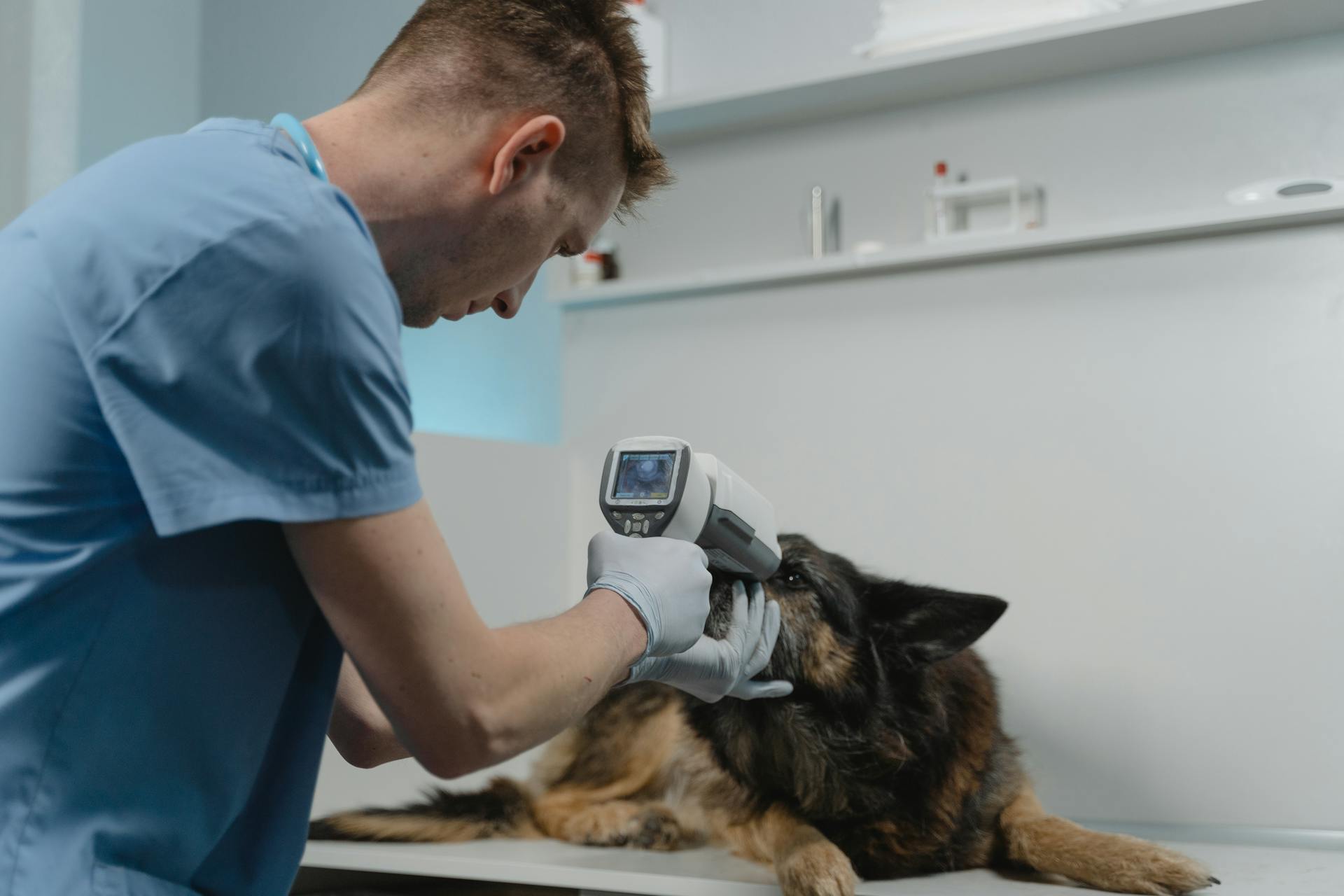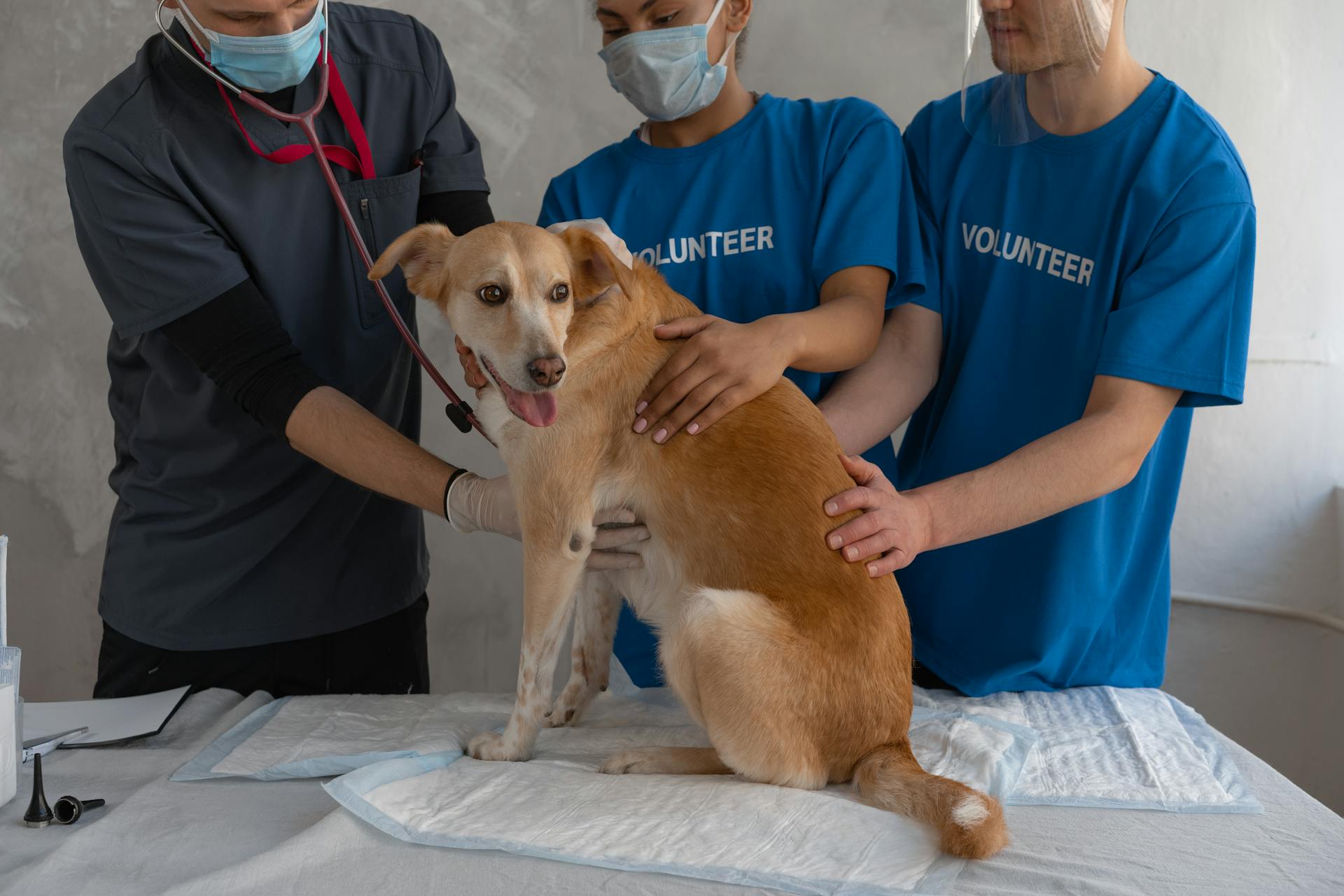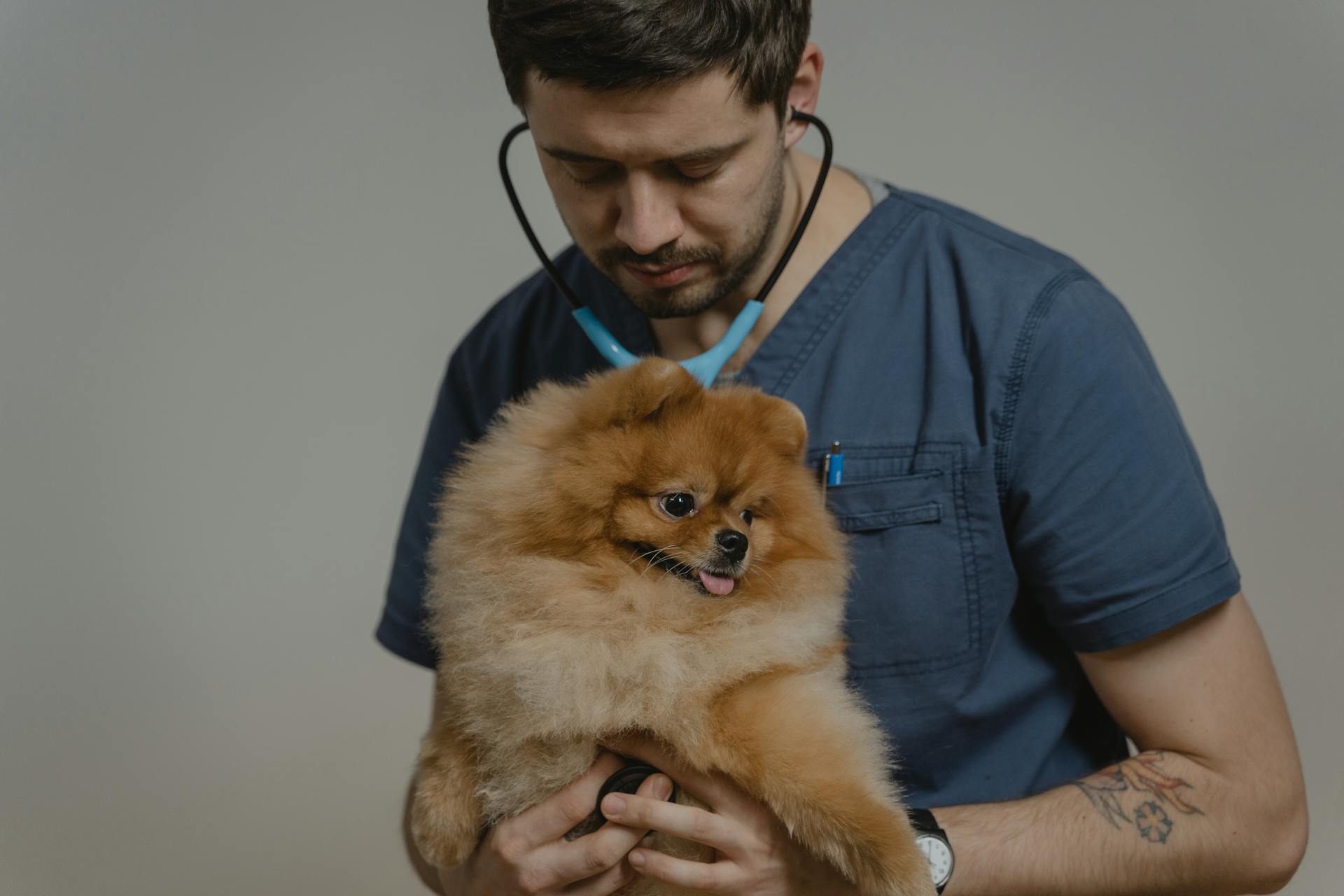
If you suspect your dog has overdosed on a drug, it's essential to act quickly and carefully. A dog drug overdose can occur when a pet ingests a toxic substance, either intentionally or accidentally.
Dogs are curious creatures and can easily get into trouble by ingesting substances they shouldn't. Some common household items that can be toxic to dogs include medications, cleaning supplies, and pesticides.
Symptoms of a dog drug overdose can vary depending on the substance ingested, but common signs include vomiting, diarrhea, lethargy, and loss of coordination. In severe cases, a dog may experience seizures, difficulty breathing, or even heart failure.
If you notice any of these symptoms, it's crucial to seek veterinary attention immediately.
Intriguing read: Dog Flea Treatment Overdose Symptoms
Causes of Overdose
A dog drug overdose can happen in a split second, and it's often due to accidental ingestion of something toxic. This can be as simple as eating a toxic substance.
Dogs are curious creatures, and they love to explore their surroundings with their mouths. This can lead to them ingesting things they shouldn't, like toxic substances.
The amount of the substance needed to cause an overdose can be surprisingly small. In some cases, it only takes a tiny amount to cause severe harm.
The way the substance enters the body can also play a role in an overdose. This can happen through ingestion, inhalation, absorption through the skin, or injection.
Here are some ways your dog can be poisoned:
- Accidental administration of dog tick and flea treatment onto a cat's skin is highly dangerous, but it can also happen to dogs.
- Even just being exposed to a toxin through contact can be enough to cause a serious case of poisoning.
The effects of an overdose can be devastating, and it's essential to know the signs to look out for. These can include attacking blood cells, limiting cellular functions, attacking the central nervous system, and slowly shutting down organs.
General Information
If your dog has ingested a toxic substance, time is of the essence. Each poisoning has a different recommended treatment protocol, but there are some general guidelines to follow. For most ingested substances, the preferred first treatment is emesis, or vomiting, to have your pet vomit any dangerous materials from their stomach before they are absorbed.
The idea is to get your dog to vomit within 2 hours of ingestion, as this is when the substance is most likely to be in their stomach. If the ingestion occurred after this time frame, vomiting may be less effective but can still be attempted for 4-6 hours after ingestion.
There are two methods of inducing vomiting: hydrogen peroxide administration, which can be potentially irritating to the gastrointestinal tract, and safer prescription drugs administered under veterinary supervision. These options allow a veterinarian to examine and treat any other abnormalities.
After vomiting, activated charcoal is often fed to dogs to bind the toxic substances and coat the gastrointestinal tract, preventing additional uptake. If your dog is showing signs of poisoning, it's essential to seek veterinary attention immediately.
Some common signs of poisoning in dogs include agitation, tremors, convulsions, nausea, and vomiting, as well as heart problems, diarrhea, and kidney failure. Keep an eye out for these symptoms and seek help if you notice any of them.
Here are some common signs of poisoning in dogs:
- Agitation
- Tremors
- Convulsions
- Nausea and/or vomiting
- Seizures
- Heart problems
- Diarrhoea
- Kidney failure
If you suspect your dog has been poisoned, it's crucial to provide supportive therapy, which may include intravenous fluids, oxygen supplementation, pain, heart, or seizure medications as indicated, and urinary catheterization for those animals unable to control their bladder.
Treatment and Response
In cases of dog drug overdose, treatment is crucial and time-sensitive. The goal is to remove the toxic substance from the body as quickly as possible.
If your dog has ingested a substance, inducing vomiting can be a potential therapy, but it's essential to act fast - the material remains in the stomach for approximately 2 hours. After vomiting, activated charcoal can be fed to your dog to bind the toxic substances and coat the gastrointestinal tract, preventing additional uptake.
Veterinarians may use prescription drugs to induce vomiting, which are safer and allow for a veterinarian to examine and treat any other abnormalities. Supportive therapy, such as intravenous fluids, oxygen supplementation, and pain medications, may also be necessary, depending on the severity of clinical signs.
Here are some common treatment options for dog poisoning:
- Antidote to counter the effects of the poison
- Fluid therapy to maintain hydration and dilute the toxin
- Anti-seizure medication or muscle relaxants
- Activated charcoal to bind with the toxin
General Treatment Principles
If your dog has ingested something toxic, every minute counts. In general, the first treatment is to induce vomiting, but this only works for a short time frame.
The stomach can absorb substances for about 2 hours, making vomiting a potential therapy during this time. If ingestion occurred after 2 hours, vomiting may still be attempted for 4-6 hours after ingestion.
There are two methods of inducing vomiting: hydrogen peroxide administration and prescription drugs under veterinary supervision. However, hydrogen peroxide can cause severe irritation and ulceration of the gastrointestinal tract, so it's not recommended without guidance from a veterinarian.
After vomiting, activated charcoal is often fed to dogs to bind the toxic substances and coat the gastrointestinal tract, preventing additional uptake.
Supportive therapy is also crucial for dogs with poisoning, and this includes intravenous fluids, oxygen supplementation, pain, heart, or seizure medications as indicated, and even urinary catheterization for those animals unable to control their bladder.
Here are some common supportive care measures:
- Intravenous fluids to maintain hydration
- Oxygen supplementation to support breathing
- Pain, heart, or seizure medications as needed
- Urinary catheterization for incontinence
What Should I Do If My Dog Has Been
Stay calm and get your dog to the vet as soon as possible.

If you know what your pet ate, gather all the information you can, including wrappers and ingredient lists, to discuss with your veterinarian.
Contact your veterinarian, an emergency veterinarian, the ASPCA's Animal Poison Control Center at 888-426-4435 or the Pet Poison Helpline at 855-764-7661. These services are staffed 24/7 by veterinarians, including toxicologists.
Many pets will accidentally ingest a potentially dangerous nonfood item throughout their life.
You might enjoy: Antifreeze Dog Poison Symptoms
Veterinary Care
If you suspect your dog has been poisoned, it's essential to get them to the vet as soon as possible. Stay calm and make sure the source of the poison is out of your dog's reach.
Gather all the information you can about what your pet ate, including wrappers and ingredient lists, to discuss with your veterinarian. This will help them identify the potential poisoning and provide the best course of treatment.
Contact your veterinarian, an emergency veterinarian, the ASPCA's Animal Poison Control Center at 888-426-4435, or the Pet Poison Helpline at 855-764-7661. These services are staffed 24/7 by veterinarians, including toxicologists.
Never try to induce vomiting, as it can cause severe inflammation and irritation of the esophagus if the ingested substance is caustic. If your pet is already showing signs of poisoning, visit your vet immediately.
If your pet's fur or paws came into contact with the toxic substance, try to keep them from grooming themselves and give them a bath in neutral pet shampoo.
Medications and Products
Dogs can easily overdose on their own medication or accidentally ingest human medications, which can be dose-dependent or inherently dangerous at any dose.
Some medications are designed to taste good, making them appealing to pets, and can be poisonous if ingested in large doses or with drug interactions.
Here are some common human medications and products that can be poisonous to dogs:
- Alcohol
- Anti-anxiety and anti-psychotic medications, such as Prozac and sleeping tablets
- Cigarettes
- Illicit drugs, such as marijuana
- Painkillers, such as Panadol and Nurofen
- Ventolin from asthma puffers
Rodenticide poisoning is also a concern, with common rat poisons including anticoagulant rodenticides, bromethalin, and cholecalciferol (Vitamin D3), each with its own unique risks and treatment options.
Alcohol

Alcohol can be toxic to dogs, causing a range of symptoms from vomiting and diarrhea to coma and death. It's absorbed quickly, often within an hour, and food can slow this process.
Dogs are more susceptible to alcohol than humans, and the amount of alcohol is measured as "alcohol by volume" or ABV. For a 10-pound dog, alcohol is lethal at specific amounts of different beverages.
Here's a breakdown of the lethal amounts for a 10-pound dog:
- 10 ounces of 6% ABV beer
- 5 ounces of 13% ABV wine
- 2 ounces of 40% ABV liquor
There is no specific antidote for alcohol poisoning, so treatment is focused on GI decontamination and supportive care. Certain medications can aid in reducing alcohol toxicosis, but can only be prescribed by a veterinarian.
Rodenticide
Rodenticide poisoning is a serious concern, especially for pet owners. There are multiple types of rat poisons, including anticoagulant rodenticides that cause uncontrolled bleeding.
If your dog ingests rat poison, it's essential to act quickly. Anticoagulant rodenticides can be treated with supportive care and vitamin K supplementation if caught early.
You might like: Symptoms of a Dog That Ate Rat Poison
Bromethalin, another common rat bait, is a neurotoxic rodenticide that causes brain swelling and seizures. Treatment is difficult once clinical signs appear, and aggressive GI decontamination and supportive care are the best options.
Cholecalciferol, or Vitamin D3, rat poison can cause a life-threatening increase in calcium levels. This can lead to pulmonary mineralization, heart problems, and organ failure.
If you suspect your dog has ingested rat poison, seek veterinary attention immediately.
Medications
Medications can be hazardous to your furry friends, even if they're prescribed for them. Some medications are inherently dangerous at any dose, while others are dose-dependent.
Dogs can easily overdose on their own medication or accidentally ingest human medications. It's not just about getting extra doses; if a dog has access to another pet's medications, it's more likely to cause an issue due to a large dose, drug interactions, and unintended drug indications.
Human medications can be particularly problematic for pets. Dogs may quickly snatch a dropped human medication off the floor or even counter-surf and have access to entire bottles. Any human medication or over-the-counter supplement can cause problems with pets.
Here are some common human medications that can harm pets:
- Veterinarians may recommend aspirin products in dogs, especially for antiplatelet effects or other medical issues. However, aspirin can cause gastric ulcerations, perforations, and liver injury in dogs.
- Ibuprofen and naproxen can cause ulcers, kidney failure, and neurological issues.
- Adderall and pseudoephedrine can cause neurologic, muscular, and heart issues.
- Topical creams and ointments can cause GI upset. Dogs can also absorb human hormonal preparations and exhibit a variety of clinical symptoms.
- Antidepressant medications can cause neurological issues in dogs.
- Cigarettes and nicotine patches can cause vomiting, cardiac and blood pressure issues, and eventually nervous system issues and possible death.
- Petroleum jelly can cause aspiration-induced respiratory issues.
- Kaopectate and Pepto Bismol can cause gastrointestinal ulcerations.
Prescription medication isn't the only type of medication that poses a threat to our pets. Pets may ingest illicit drugs, such as marijuana, or other substances like alcohol and painkillers.
Frequently Asked Questions
How long does it take a dog to get over toxicity?
Recovery time from toxicity in dogs varies greatly, ranging from immediate to several weeks or even months, depending on the toxin, treatment timing, and severity of symptoms. The duration of recovery can be unpredictable, making prompt veterinary attention crucial.
Sources
- https://www.vet.cornell.edu/departments-centers-and-institutes/riney-canine-health-center/canine-health-information/chocolate-toxicity-what-should-i-do-if-my-dog-eats-chocolate
- https://www.petmd.com/dog/poisoning/poisons-dogs
- https://www.mountvetspets.com/13-pet-poisons/
- https://animalemergencyservice.com.au/blog/pets-and-poisons/
- https://www.germantownah.com/site/blog-memphis-vet/2019/11/11/dog-poisoned-signs-symptoms
Featured Images: pexels.com


